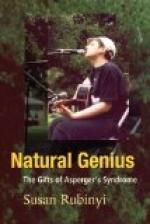A word as to the lady for whose benefit these gifts are brought together. The preface of Mr. Bryant and the letter of Mr. Butler, tell her story with sufficient distinctness, and the readiness with which our men and women of letters have so generally complied with her request, shows what eloquence she bears in her presence and statement. Some certificates from her pupils in drawing, who testify to her love of nature and her delight in sketching directly from nature, so greatly to their improvement in this beautiful art, give peculiar pathos to her case. The organ that was the source of her highest satisfaction is closed up by this dark sorrow, and the gate called Beautiful, to this earthly temple no longer is open to scenes and faces of loveliness. What a fearful loss is this loss of sight—on the whole the noblest of the senses, and certainly the sense of all others most serviceable, alike to the working hand and the creative imagination. The eye may not be so near the fountains of sensibility as the ear, and no impression reaches the sympathy so profoundly as the pathos of living speech, but the eye has a far wider range than the ear and fathoms the heavens and sweeps the earth and sea, whilst the ear hears distinctly but within a very narrow limit, hardly a stone’s throw. When the eye, then, loses its marvellous faculty and sees no longer the light of day and the countenances of friends, let the ear do what it can to make up for the loss by every cheering word of sympathy and hope. In God’s Providence there is a principle of compensation that aims to balance every privation by some new privilege, as for instance by giving new acuteness to the senses which are called to do the work of the senses lost. But genial humanity is the great principle of compensation, and by this God’s children glorify the Father in Heaven. May this volume serve his merciful will, and may the light shed from the stars of our literary firmament do something to lessen the night upon every dark path.
S.O.
GIFTS OF GENIUS.
Out at elbows.
The story of st. George cleave.
By John Esten Cooke, of Virginia.
I.
How good a thing it is to live! The morn is full of music; and Annie is singing in the hall!
The sun falls with a tranquil glory on the fields and forests, burning with the golden splendors of the autumn—the variegated leaves of the mighty oaks are draped about the ancient gables, like a trophy of banners. The landscape sleeps; all the world smiles—shall not I?
I sat up late last night at my accounts; to-day I will take a holiday. The squire has bidden me good morning in his courteous, good-humored way, and gone in his carriage to attend a meeting of his brother magistrates:—I am away for the time from my noisy courts—the domain is mine—all the world is still!




